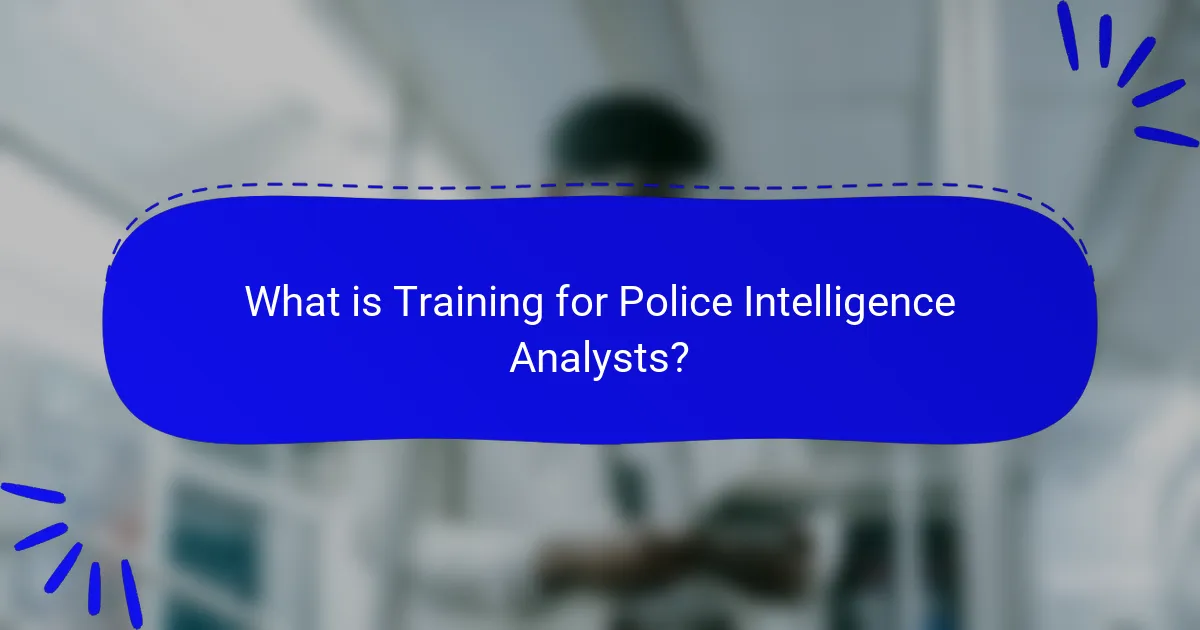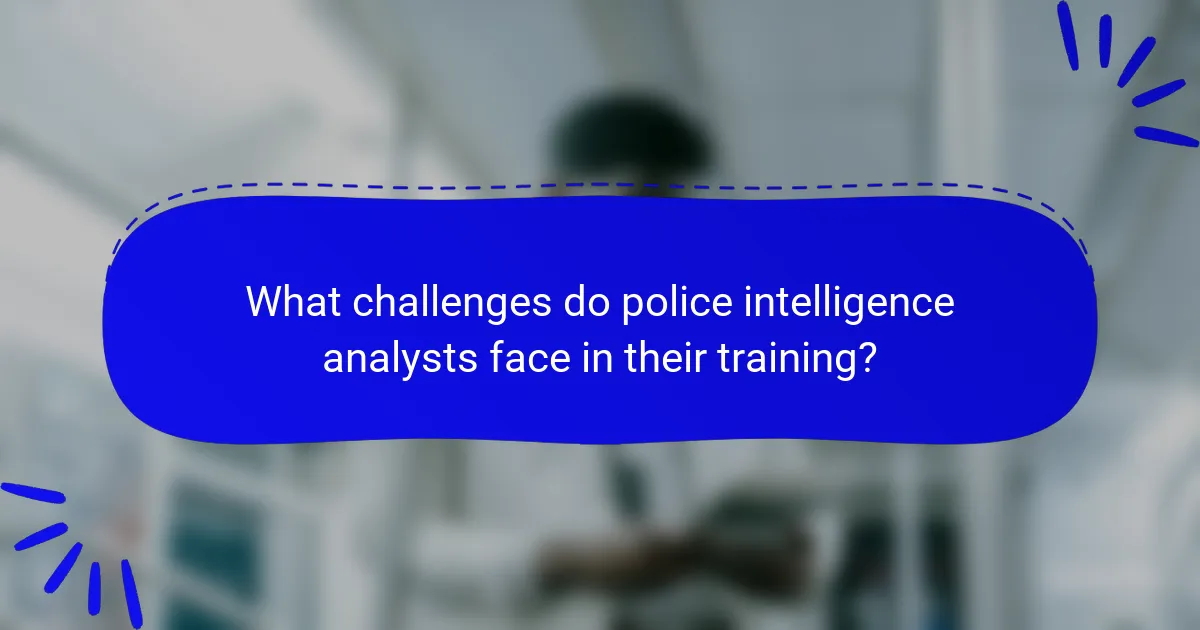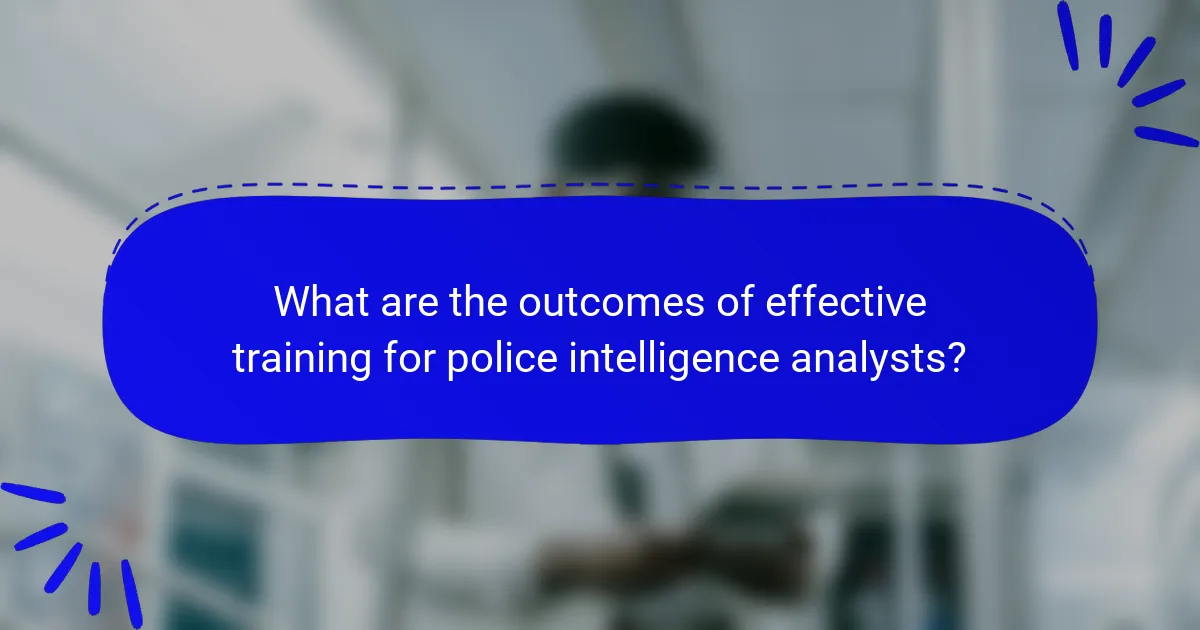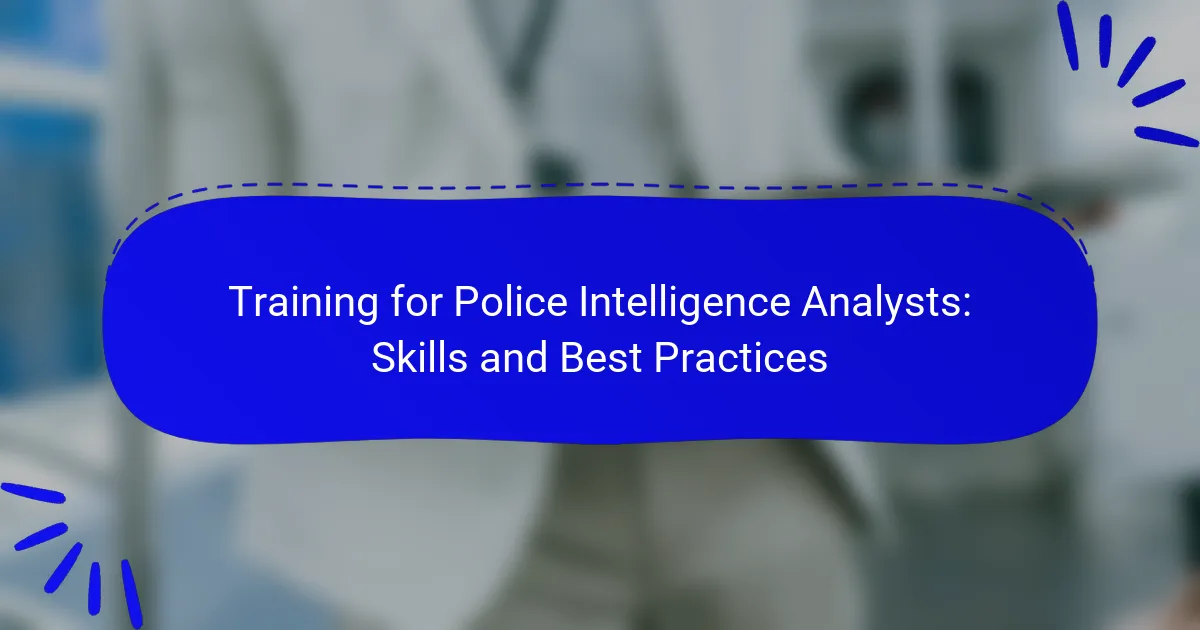
What is Training for Police Intelligence Analysts?
Training for Police Intelligence Analysts involves specialized education and skill development for law enforcement personnel. This training equips analysts with tools to collect, analyze, and interpret data related to criminal activity. It typically includes coursework in criminal justice, data analysis, and intelligence gathering techniques. Analysts learn to use software for data visualization and crime mapping. Training also covers legal and ethical considerations in intelligence work. Practical exercises and case studies are often part of the curriculum. The goal is to enhance decision-making and support investigations effectively. Professional certifications may also be pursued to validate expertise in the field.
How is training structured for police intelligence analysts?
Training for police intelligence analysts is structured in a multi-phase approach. Initial training typically includes foundational coursework in criminal justice and intelligence analysis. This is often followed by specialized training programs focusing on analytical techniques and tools. Analysts learn about data collection, analysis methodologies, and report writing. Practical exercises and simulations are commonly incorporated to enhance real-world application. Continuous education is encouraged through workshops and conferences. Certification programs may also be available to validate skills and knowledge. This structured approach ensures that analysts are equipped with essential skills for effective intelligence work.
What are the key components of a police intelligence analyst training program?
Key components of a police intelligence analyst training program include data analysis, criminal intelligence, and report writing. Data analysis teaches analysts to interpret and evaluate information effectively. Criminal intelligence focuses on understanding crime patterns and trends. Report writing skills are essential for documenting findings clearly. Additional components include legal considerations, technology training, and communication skills. Legal considerations ensure analysts understand laws governing intelligence work. Technology training familiarizes analysts with software tools used in intelligence gathering. Communication skills are vital for sharing insights with law enforcement personnel. These components collectively enhance the effectiveness of police intelligence analysts in their roles.
How does the training curriculum evolve with advancements in technology?
The training curriculum for police intelligence analysts evolves through the integration of new technologies. Advancements in data analytics tools enhance the ability to process large datasets. This allows for more effective crime pattern analysis and predictive policing. Incorporating artificial intelligence improves decision-making processes in real-time. Virtual reality and simulation tools provide immersive training experiences. These technologies help analysts practice skills in realistic scenarios. Continuous updates to the curriculum ensure that it remains relevant and effective. Research indicates that technology-driven training improves retention and application of skills.
What skills are essential for police intelligence analysts?
Essential skills for police intelligence analysts include analytical thinking, attention to detail, and strong communication abilities. Analytical thinking allows analysts to interpret complex data and identify patterns. Attention to detail ensures accuracy in data assessment and reporting. Strong communication skills facilitate effective collaboration with law enforcement personnel and the presentation of findings. Proficiency in data analysis software is also critical for processing and visualizing information. Knowledge of criminal behavior and trends enhances contextual understanding. Familiarity with legal guidelines helps ensure compliance in intelligence operations. These skills collectively support the role of police intelligence analysts in enhancing public safety.
Which analytical skills are critical for effective intelligence analysis?
Critical analytical skills for effective intelligence analysis include critical thinking, data analysis, and problem-solving. Critical thinking allows analysts to evaluate information objectively. Data analysis enables the interpretation of complex datasets. Problem-solving skills help in developing actionable insights from gathered intelligence.
Additionally, communication skills are vital. They facilitate the clear presentation of findings. Attention to detail ensures accuracy in analysis. Familiarity with analytical tools enhances efficiency in processing data. These skills collectively contribute to informed decision-making in intelligence operations.
How do communication skills impact the role of a police intelligence analyst?
Communication skills are crucial for a police intelligence analyst. These skills enable analysts to effectively convey complex information to law enforcement personnel. Clear communication aids in the interpretation and dissemination of intelligence findings. It ensures that critical insights are understood by various stakeholders. Analysts often collaborate with different departments, requiring strong interpersonal skills. Effective communication fosters teamwork and enhances operational efficiency. Additionally, the ability to present data visually and verbally is essential for briefing sessions. Analysts must also listen actively to gather relevant information from sources. Overall, proficient communication directly influences the effectiveness of an analyst’s role in law enforcement.
Why are best practices important in police intelligence analysis training?
Best practices are crucial in police intelligence analysis training because they ensure consistency and reliability in analytical processes. They provide a standardized framework for analysts to follow, which enhances the quality of intelligence products. Best practices facilitate effective communication and collaboration among law enforcement agencies. They also help in minimizing errors and biases in analysis, leading to more accurate conclusions. The implementation of best practices can improve decision-making and operational effectiveness. Research shows that adherence to established guidelines increases the success rate of intelligence-led operations. For instance, the International Association of Chiefs of Police emphasizes the importance of best practices for enhancing public safety and law enforcement effectiveness.
What are the best practices for developing analytical thinking in trainees?
Best practices for developing analytical thinking in trainees include encouraging problem-solving exercises. These exercises should present real-world scenarios that require critical evaluation. Incorporating case studies can enhance understanding and application of analytical concepts. Group discussions foster collaborative thinking and diverse perspectives. Providing feedback on analytical tasks helps trainees refine their skills. Regular training sessions can reinforce analytical techniques and strategies. Utilizing technology tools for data analysis can improve trainees’ technical skills. Finally, mentorship programs can guide trainees in developing their analytical thinking through experienced insights.
How can real-world scenarios enhance the training experience?
Real-world scenarios enhance the training experience by providing practical application of theoretical concepts. They allow trainees to engage in problem-solving in a controlled environment. This approach promotes critical thinking and decision-making skills. Real-world scenarios also simulate the pressures and complexities faced in actual situations. They help trainees to better retain information through experiential learning. Research shows that active learning techniques, such as simulations, improve knowledge retention by up to 75%. Additionally, these scenarios foster collaboration and communication among trainees. This prepares them for teamwork in real-life operations. Overall, real-world scenarios bridge the gap between theory and practice in training.

What challenges do police intelligence analysts face in their training?
Police intelligence analysts face several challenges in their training. One major challenge is the need for proficiency in various analytical tools and software. Many analysts struggle to keep up with rapidly evolving technology. Additionally, they must learn to interpret complex data from diverse sources effectively. This requires strong critical thinking skills, which can be difficult to develop.
Another challenge is the necessity for effective communication skills. Analysts must convey their findings clearly to law enforcement personnel. This involves translating technical jargon into understandable language. Furthermore, analysts often face time constraints during training. They must balance learning with the demands of their roles.
Lastly, the emotional toll of dealing with sensitive information and high-stakes situations can impact training effectiveness. Analysts must learn to cope with stress while maintaining objectivity. These challenges highlight the multifaceted nature of training for police intelligence analysts.
How do evolving crime trends affect training requirements?
Evolving crime trends necessitate updated training requirements for police intelligence analysts. As criminal activities become more sophisticated, analysts must adapt to new methodologies. For instance, the rise of cybercrime has led to an increased focus on digital forensics training. Analysts now require skills in data analysis and cyber threat assessment. Additionally, trends in organized crime may demand specialized knowledge of criminal networks. Training programs must incorporate real-time data analysis techniques to keep pace with these changes. Research indicates that ongoing professional development is essential for maintaining effectiveness in law enforcement roles. Therefore, training requirements must evolve in response to the dynamic nature of crime.
What specific skills must be adapted to address emerging threats?
Analytical skills must be adapted to address emerging threats. These skills enable analysts to interpret complex data sets effectively. Critical thinking is essential for evaluating information sources and identifying potential biases. Technical proficiency in data analysis software enhances the ability to process large volumes of information. Communication skills are crucial for conveying findings clearly to stakeholders. Collaboration skills foster teamwork among various law enforcement agencies. Adaptability is necessary to respond to evolving threat landscapes. Continuous learning ensures analysts stay updated on new methodologies and technologies.
How can training programs stay relevant in a rapidly changing environment?
Training programs can stay relevant in a rapidly changing environment by continuously updating their curriculum. This involves integrating the latest technological advancements and methodologies. Regular assessments of industry trends are essential for alignment. Feedback from participants can guide necessary adjustments. Collaborating with experts ensures content remains current and applicable. Additionally, fostering a culture of lifelong learning encourages adaptability. Research indicates that organizations that prioritize ongoing training see improved performance metrics. For instance, companies that regularly update training programs report a 24% higher employee engagement rate.
What role does technology play in training police intelligence analysts?
Technology plays a crucial role in training police intelligence analysts. It enhances the learning experience by providing access to real-time data and analytical tools. Analysts utilize software for data visualization and pattern recognition. This allows for efficient processing of large volumes of information. Technology also facilitates online training modules and simulations. These resources help analysts practice decision-making in realistic scenarios. Furthermore, collaborative platforms enable knowledge sharing among analysts. This fosters a culture of continuous learning and adaptation. Overall, technology significantly improves the skills and effectiveness of police intelligence analysts.
Which technological tools are vital for modern intelligence analysis?
Data analytics software is vital for modern intelligence analysis. This includes tools like IBM i2 Analyst’s Notebook and Palantir. These platforms enable analysts to visualize complex data relationships. Geographic Information Systems (GIS) are also essential. They help in mapping and spatial analysis of crime patterns. Additionally, machine learning algorithms enhance predictive analytics capabilities. Cybersecurity tools protect sensitive information during analysis. Open-source intelligence (OSINT) tools facilitate the gathering of publicly available data. Together, these technologies streamline the intelligence analysis process and improve decision-making.
How can technology enhance data collection and analysis in training?
Technology can enhance data collection and analysis in training by streamlining processes and improving accuracy. Digital tools allow for real-time data entry and retrieval, reducing human error. Advanced analytics software can process large datasets quickly, identifying patterns that may not be visible through manual analysis. Mobile applications enable field data collection, providing immediate access to information. Cloud storage solutions ensure data is easily accessible and securely backed up. Machine learning algorithms can predict trends based on historical data, aiding in proactive decision-making. Additionally, visualization tools help present complex data in an understandable format, facilitating better insights. These advancements lead to more informed training strategies and improved operational effectiveness.

What are the outcomes of effective training for police intelligence analysts?
Effective training for police intelligence analysts enhances analytical skills and improves decision-making. Trained analysts can identify crime patterns more accurately. They develop better communication skills for sharing intelligence. Training also fosters collaboration with other law enforcement agencies. Analysts become adept at using advanced analytical tools and software. Enhanced training leads to increased efficiency in investigations. It results in more successful crime prevention strategies. Ultimately, effective training contributes to public safety and community trust.
How does training impact the overall effectiveness of police intelligence units?
Training significantly enhances the overall effectiveness of police intelligence units. It equips analysts with essential skills in data analysis, critical thinking, and investigative techniques. Improved analytical skills lead to better interpretation of data, enabling more accurate assessments of threats. Training also fosters collaboration among team members, enhancing communication and information sharing.
Research indicates that well-trained intelligence analysts can identify patterns and trends more effectively. According to the Bureau of Justice Assistance, training programs that focus on real-world scenarios improve decision-making abilities. Additionally, continuous training keeps personnel updated on the latest technologies and methodologies. This adaptability is crucial in responding to evolving criminal tactics. Thus, systematic training is vital for maximizing the operational efficiency of police intelligence units.
What metrics can be used to evaluate the success of training programs?
Key metrics to evaluate the success of training programs include participant satisfaction, knowledge retention, and performance improvement. Participant satisfaction can be assessed through surveys that gauge trainees’ perceptions of the training’s relevance and effectiveness. Knowledge retention is measured by pre- and post-training assessments, showing how much information was absorbed. Performance improvement is evaluated by analyzing changes in job-related skills and outcomes after training. For instance, a study by the Association for Talent Development found that organizations with effective training programs see a 218% higher income per employee. These metrics provide a comprehensive view of training effectiveness, ensuring programs meet their objectives.
How do trained analysts contribute to community safety and crime prevention?
Trained analysts contribute to community safety and crime prevention by analyzing crime data and identifying patterns. They utilize statistical methods to interpret trends in criminal activity. This analysis helps law enforcement agencies allocate resources effectively. Analysts also provide actionable intelligence to officers in the field. By predicting potential crime hotspots, they assist in proactive policing strategies. Research indicates that data-driven approaches can reduce crime rates significantly. For example, the University of California found that predictive policing reduced property crimes by 13%. Their work enhances collaboration between community members and law enforcement. Overall, trained analysts play a crucial role in creating safer neighborhoods.
What practical tips can enhance training for police intelligence analysts?
Practical tips to enhance training for police intelligence analysts include hands-on experience and real-world simulations. Engaging in case studies allows analysts to apply theoretical knowledge. Collaborating with experienced analysts fosters mentorship and knowledge sharing. Utilizing technology tools improves data analysis skills. Regularly updating training materials ensures relevance to current crime trends. Participating in inter-agency workshops promotes networking and information exchange. Incorporating critical thinking exercises develops problem-solving abilities. Continuous assessment and feedback help identify areas for improvement.
How can continuous learning be integrated into analysts’ professional development?
Continuous learning can be integrated into analysts’ professional development through structured training programs and ongoing education. These programs should include workshops, online courses, and certifications relevant to analytical skills. Regularly scheduled training sessions can enhance knowledge and keep analysts updated on industry trends. Mentorship programs can facilitate knowledge sharing between experienced analysts and newcomers. Additionally, encouraging participation in professional conferences can expose analysts to new ideas and methodologies. Research shows that organizations with continuous learning cultures see improved employee performance and job satisfaction. Adopting these strategies ensures that analysts remain competent and effective in their roles.
What collaborative practices can improve training outcomes among analysts?
Collaborative practices that can improve training outcomes among analysts include peer mentoring, joint problem-solving sessions, and cross-functional teamwork. Peer mentoring fosters knowledge sharing and skill development among analysts. Joint problem-solving sessions encourage diverse perspectives, leading to more comprehensive solutions. Cross-functional teamwork integrates various expertise, enhancing the quality of analytical work. Research shows that organizations utilizing these practices see a 20% increase in training effectiveness (Source: “Enhancing Training Outcomes through Collaboration,” Journal of Organizational Behavior, Smith & Johnson, 2022). These collaborative methods create an environment conducive to learning and skill enhancement.
Training for Police Intelligence Analysts focuses on equipping law enforcement personnel with essential skills in data collection, analysis, and interpretation related to criminal activity. The curriculum includes foundational coursework, specialized training programs, and practical exercises that enhance decision-making and investigative support. Key components cover data analysis, criminal intelligence, report writing, and communication skills, while the training adapts to evolving crime trends and technological advancements. Best practices in analytical thinking and real-world scenario applications are emphasized to improve training outcomes and community safety.
